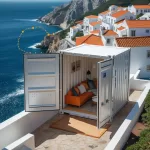
Portugal Customs Rules for Movers: Your Essential Guide to a Smooth Relocation 🇵🇹📦
Moving to a new country like Portugal is an exciting adventure! You might be dreaming of sunny beaches, delicious food, and a relaxed lifestyle. But before you can settle into your new home, there’s a big step many people worry about: getting your belongings through customs. Understanding Portugal customs rules for movers is super important to avoid surprises, delays, or extra costs.
This guide will break down everything you need to know, from what documents to prepare to what items you can and can’t bring. Our goal is to make your move as smooth as a Portuguese olive oil! Let’s get started.
Key Takeaways
- Duty-Free Eligibility: Most personal belongings can enter Portugal duty-free if you’re officially transferring your residency and have owned/used the items for at least 6 months.
- Essential Documentation: A detailed inventory list, proof of residency transfer (like your visa), a Portuguese Tax Identification Number (NIF), and a Declaration of Transfer of Residence (DTR) are crucial.
- Special Items: Vehicles and pets have specific rules, including ownership periods and health requirements, to qualify for duty-free entry or smooth passage.
- Prohibited Items: Be aware of items like illegal drugs, firearms (without permits), and certain plants or foods that are strictly forbidden or highly restricted.
- Plan Ahead: Start preparing your documents and understanding the rules well before your move to avoid delays and make the customs process much easier.
Understanding Portuguese Customs for Movers
When you move your whole life to a new country, it’s not like bringing a souvenir back from vacation. You’re bringing your furniture, clothes, books, and all the things that make your house a home. This process is called “transfer of residency,” and customs rules are designed specifically for it.
Why Customs Matter
Think of customs as the border control for goods. They make sure that what comes into Portugal is safe, legal, and that the right taxes are paid. For movers, Portugal offers a special benefit: you can usually bring your personal belongings into the country without paying extra taxes (duties and VAT). This is a huge saving! But to get this benefit, you need to follow certain rules and show the right documents.
Who is a “Mover” in the Eyes of Customs?
You’re considered a “mover” (or someone transferring residency) if you’ve been living outside Portugal and are now moving to live there permanently. This usually means you have a visa or residence permit showing your intention to make Portugal your new home. It’s not for short-term visitors or people who keep their main home somewhere else.
The Golden Rule: Duty-Free Importation of Personal Belongings
The best news for movers is the possibility of importing your personal items without paying duties or Value Added Tax (VAT). This is often called “duty-free” entry. However, it’s not automatic. You need to meet specific conditions set by Portuguese customs.
Conditions for Duty-Free Status 🏷️
To qualify for duty-free import of your personal goods, you generally need to meet these key conditions:
- Residency Transfer: You must be genuinely moving to Portugal to establish your normal residence. This means you’ll need to show proof, such as your Portuguese visa, residence permit, or other official documents.
- Previous Residence: You must have lived outside Portugal for at least the past 12 months. This proves you’re not just buying new items to bring in tax-free.
- Ownership and Use: The items you’re bringing must have been owned by you and used by you (or your family) at your previous home for at least 6 months before you move. This prevents people from buying brand-new items just before moving to avoid taxes. Keep receipts or proof of purchase if possible for valuable items.
- Time Limits for Import: Your belongings must be imported within 12 months of the date you officially establish your residence in Portugal. It’s usually best to do it shortly after you arrive.
- No Sale for 12 Months: Once your items are in Portugal duty-free, you cannot sell, rent, or lend them for at least 12 months after their import date. This rule is in place to prevent people from using the duty-free status to import goods for commercial purposes.
What Counts as “Personal Belongings”?
This includes most of the things you’d find in a typical home:
- Furniture (tables, chairs, beds) 🛋️
- Clothing and linens 👕
- Kitchenware and appliances (refrigerators, washing machines) 🧺
- Books, CDs, DVDs, and personal electronics (TVs, computers) 💻
- Tools of your trade or profession (if they’re personal tools, not commercial equipment) 🛠️
- Other household effects that are clearly for your personal or family use.
💡 Pull Quote: “Don’t underestimate the power of preparation! Having your documents in order before your belongings arrive is the single most important step for a smooth customs process.”
Essential Documents You’ll Need
Getting your documents ready is probably the most time-consuming part, but it’s vital. Missing even one paper can cause significant delays and headaches. Here’s a list of the most important documents you’ll need:
Key Documents Checklist 📝
| Document | Purpose | Notes



